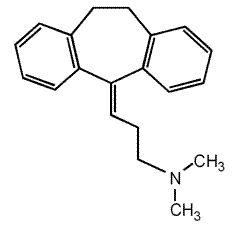
Tricyclic antidepressants (TCAs)
The document titled "Focus on Tricyclic antidepressants" provides information of each drug within the TCA class. Click on the document below to learn about:
-
Adverse effects
-
Cautions
-
Contra-indications
-
Drug interactions
-
Cost amongst other important prescribing considerations

-
Tricyclic antidepressants: amitriptyline hydrochloride, clomipramine hydrochloride, dosulepin hydrochloride, imipramine hydrochloride, lofepramine, nortiptyline (and related antidepressants)
-
These act by blocking the uptake of noradrenaline (NA) and serotonin (5HT)
-
Tricyclic antidepressants offer similar efficacy to SSRIs, however they are more likely to be discontinued due to side effects. Toxicity in overdose is a particular concern in this class of antidepressants.
-
If patients are taking TCA's, they must be advised to continue taking their medication as tolerance to some of the side effects can develop
-
They can also exhibit sedating and less sedating properties as shown in the table
-
Due to the fact that antidepressants initially exacerbate conditions that the patient may already be suffering from, they must be used with care in patients who display suicidal ideation/behaviour, or have a history of bipolar affective disorder or psychosis
-
Treatment with TCAs must be stopped if the patient enter a manic phase
-
As one of the major concerns of TCAs is the risk of overdose, preventative measures must be taken. This involves supplying minimal quantities of TCAs at any one time. Both doselupin and amitriptyline possess the highest risk of fatality in terms of overdose
-
Patients must be warned about the possibe risk of interfering with skilled tasks such as driving, as they may also enhance effects of alcohol.
-
Breast feeding: with the exception of doxepin, TCAs including related TCAs e.g. mianserin and trazodone, amounts are too little to cause harm
-
Approximately 10-20% of patients poorly respond to TCAs and related antidepressants. Insufficient dosing may be responsible for a few of these failures.
-
TCAs also offer the advantage of ONCE DAILY administration, due to their long 1/2 lives (usually at night), therefore modified release forms are not required.
Amitriptyline
Imipramine
Chemical structure of some tricyclic antidepressants

Nortriptyline

